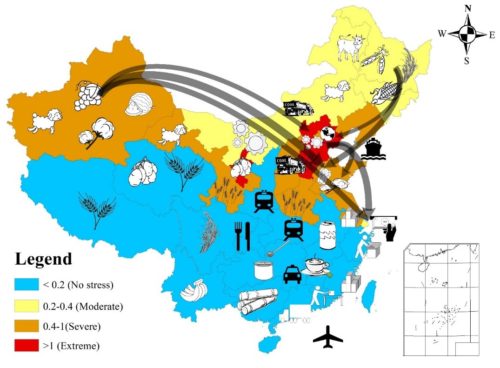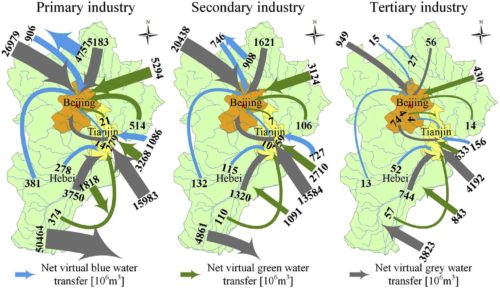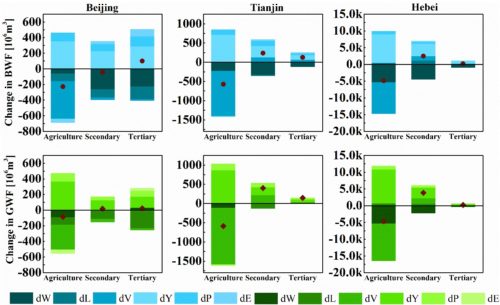Dandan Zhao is a postdoctoral researcher in Water & Development Research Group – her research concentrates on water footprints and water resources regulation. In this post, she enlightens her experience in water footprint assessment at sectoral scale and her new topic in Aalto.
My background
I got my PhD degree from Beijing Forestry University in China in 2019. My research interests are focused on natural resources consumed by human activities. My research is focused on natural resources consumed by human activities. I’m interested in variation across industries and regions, and in the driving forces of resources consumption in supply-chain systems. The aim of the research is to support effective strategies to improve sustainability at regional, national and global levels. My specific research areas are water footprint assessment, virtual water trade, environmental input-output analysis and ecological network analysis.
In my doctoral dissertation I explored how water footprint is divided across economic sectors and how trade transaction in Beijing-Tianjin-Hebei region (the so-called ”Capital region” in China) controls the system. This area is the national hotspot in terms of population, industry, and water resources. In my thesis, I developed an industrial water footprint (WF) assessment model through coupling a multi-regional input-output model and a GEPIC (GIS-based Environmental Policy Integrated Climate) model. Industrial water footprint was analyzed from both production and consumption perspectives.

Export driven economic development will worsen water stress in Hebei, China
The results showed that Beijing and Tianjin are net importers of green, blue and grey water from Hebei and other China provinces to support their needs. Conversely, Hebei exports all WF colors to Beijing, Tianjin and other provinces in China, and more than 60% of WF is transferred as virtual water (See Figures 1-2). “Virtual Water Strategy” is one measure which could alleviate water stress at the regional scale, with consideration of financial compensation from water receiving regions made to water supplying regions in the context of achieving water management targets. Our research suggests that a continuation of an export-based economic development model will worsen Hebei’s water stress. Reducing the dependency of Hebei’s sectoral economy on export of water intensive and low value added agricultural products may be one strategy to reduce the pressure on regional water resources.

To assess the driving factors for production-based industrial water footprint from 2002 to 2012, I developed a driving force model by coupling input-output models and structure decomposition analysis model (Figure 3). Our key findings highlight the differences in sectoral development. Observed changes were mainly caused by direct water consumption intensity and consumption patterns. To conclude, direct water use intensity is the key driving force responsible for restraining the increase of water footprint and consumption patterns mainly affect the growth of water footprints of all colors.

Through these studies, I have obtained an in-depth understanding about how the water resources associates with sustainability through economic systems. This knowledge will help me to develop the modelling framework to understand environmental outcomes of economic systems very well. In addition, my knowledge enables me to quantitatively determine the footprints and support the science-based targets for different actors across geographical scales, based on the environmental pressures in each region and the resilience of the systems.
During my visit in the Water and Development Research Group, I will continue to quantify the trade-offs and synergies of economic-social-environmental dimensions under water-supply constraints in China. I will propose a coupled approach that integrates mixed input-output model with scenario analysis to quantify the trade-offs and synergies under water-supply constraints at sectoral level in Beijing-Tianjin-Hebei urban agglomeration (the so-called “Capital region”). This intergraded approach provides support policymaking in assessing the trade-offs and synergies among multiple criterions and by downscaling United Nation’s Sustainable Development Goals (SDG) to a regional level, I identify priorities for supporting achieving the SDGs for the local governments and practitioners.
Dandan Zhao works as a Postdoctoral researcher at Aalto University’s Water and Development Group in Helsinki, Finland. She holds Phd degree in wetland ecology, and a BSc in Resources Environment and Urban/Rural Planning, both from the Beijing Forestry University

